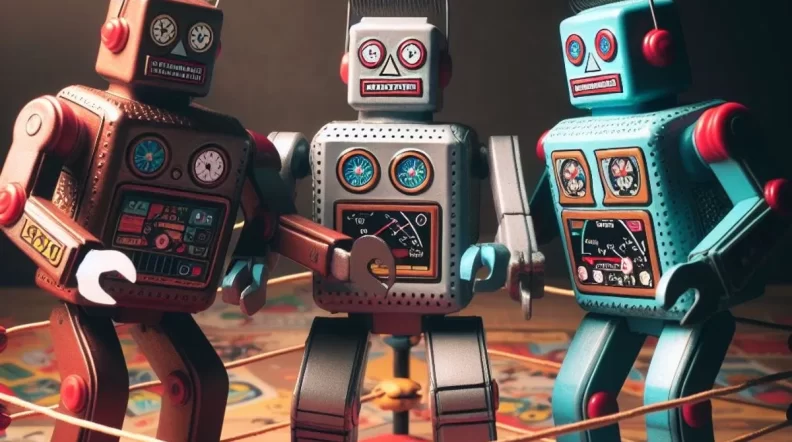Meta vs Gemini vs OpenAI: A Detailed Comparison for 2024






In 2024, the AI landscape is dominated by groundbreaking technologies from Meta, Gemini, and OpenAI, each bringing unique strengths to the table. OpenAI’s GPT-4 turbo and Meta’s integration with various operating systems highlight the diverse approaches to AI development. Meanwhile, Google’s Gemini Pro introduces an innovative angle, showcasing the rapid evolution of AI capabilities.
Comparing these giants involves delving into the specifics of technologies like GPT-4, Claude 3 Opus, and the strategic deployment of AI models across different platforms. The competition not only defines the current state of AI but also sets the stage for future innovations, influencing how businesses and developers leverage AI to solve complex problems.
Navigating the Giants of AI: OpenAI, Meta, and Gemini
Understanding the impact of OpenAI, Meta, and Gemini in the AI space requires a closer look at their flagship models, notably OpenAI’s GPT-4. This model has set a new benchmark in natural language processing, challenging competitors and pushing the boundaries of what AI can achieve in understanding and generating human-like text.
The Evolution of Artificial Intelligence Models
The journey of AI models has seen exponential growth, from simple algorithms to complex systems capable of learning and adapting. This evolution reflects in the sophisticated capabilities of current AI technologies, where models understand context, generate coherent responses, and even predict future trends with remarkable accuracy.
How OpenAI, Meta, and Gemini are Shaping the Future
OpenAI, Meta, and Gemini are at the forefront of AI innovation, each contributing to the shaping of a future where AI is integral to every aspect of life. From enhancing user interactions to driving efficiency in operations, their technologies promise to redefine our approach to problem-solving and creativity.
The Power Struggle: Context Window and Parameters
The battle among AI giants often revolves around the context window and the number of parameters their models can handle. Google’s Gemini and OpenAI’s models, with their trillion parameters capacity, showcase the intense competition to achieve the most coherent and contextually relevant text generation, pushing the limits of AI’s understanding and creativity.
Meta’s LLaMA vs OpenAI’s GPT vs Gemini’s Unique Approach
While Meta’s LLaMA and OpenAI’s GPT-4 Turbo emphasize scalability and adaptability across various operating systems, Google Gemini Pro presents a distinct approach, focusing on specialized applications. This diversity in strategy underlines the rich tapestry of AI development, highlighting the strengths and potential of each model to revolutionize different sectors.
Unveiling the Technologies: Deep Dive into Each AI
A deep dive into the technologies of OpenAI, Meta, and Gemini reveals the intricacies of their AI models, showcasing the advancements from foundational algorithms to sophisticated systems capable of understanding and interacting with the world in unprecedented ways.
OpenAI and the Revolution of Chat GPT
OpenAI has revolutionized the field of natural language processing with its Chat GPT models, setting new standards for how machines understand and generate human-like text, thereby transforming interactions between humans and machines.
From GPT-3 to GPT-4: The Leap Forward
The transition from GPT-3 to GPT-4, including the GPT-4 Turbo, marks a significant leap in AI capabilities. These advancements illustrate the rapid pace of innovation in AI, with each iteration bringing us closer to achieving truly autonomous artificial intelligence. Claude 3 Opus, alongside, represents another stride towards refining AI’s understanding of complex human inquiries and interactions.
Meta’s LLaMA: The Dark Horse in AI
Meta’s introduction of LLaMA 3 8b has positioned it as a dark horse in the AI race, challenging established players with its unique capabilities and promising to redefine the landscape of artificial intelligence.
Why Meta Claims LLaMA Beats Most Models, Including Gemini
Meta asserts that LLaMA surpasses most models, including Gemini, in key performance metrics. This bold claim highlights the competitive nature of AI development, where innovation and performance are paramount.
Google’s Gemini: A New Contender in AI
Google’s entry with Gemini signifies a new chapter in AI competition, introducing a model that combines unique features to challenge the current paradigms of machine learning and natural language processing.
Gemini’s Innovative Features vs Chat GPT’s Capabilities
The innovations brought by Google’s Gemini, when compared to OpenAI’s Chat GPT capabilities, underscore the dynamic nature of AI research and development. Gemini’s unique features set a new benchmark that rivals, including the GPT-4 Turbo, strive to meet, pushing the envelope of what AI can achieve.
Practical Applications and Impact
The practical applications of AI by Meta, Gemini, and OpenAI are vast, affecting every facet of human life, from enhancing user experiences to reshaping industries.
Enhancing User Experience Across Platforms
The deployment of AI assistants, Meta AI, and Google’s Gemini across various platforms has significantly enhanced user experiences, making interactions more intuitive, personalized, and efficient.
Real-Time AI Image Generation and Its Implications
Real-time AI image generation is rapidly transforming how we create and interact with digital content. The role of shaping user experiences and content creation is increasingly falling into the hands of generative AI tools. These tools can produce high-quality images within seconds, catering to the demands of various sectors including entertainment, education, and marketing. The implications of this technology stretch far beyond convenience, potentially revolutionizing the way we visualize ideas and bringing a new era of digital creativity.
The Future of Work: AI’s Role in Efficiency and Job Creation
Artificial Intelligence (AI) is drastically altering the landscape of work. It’s not just about automating routine tasks anymore; AI is now playing a critical role in enhancing efficiency and even creating new job opportunities. By taking over repetitive tasks, AI allows humans to focus on more creative and strategic activities, potentially leading to higher job satisfaction and productivity.
Debating AI’s Threat to Jobs vs Its Potential to Power-Up Work Efficiency
The conversation around AI often swings between its potential to threaten jobs and its ability to improve work efficiency. Tools like GPT-4 Turbo and Claude 3 Opus are at the forefront, offering advanced capabilities that can streamline workflows and generate new forms of content. While some fear the loss of jobs to machines, these developments also hint at a future where AI could unlock human potential and lead to the creation of new roles that we cannot even imagine today.
The Competitive Edge: AI Benchmarks and GenAI IQ Tests
In the race to lead the AI industry, companies are increasingly relying on AI systems’ performance metrics. Through AI benchmarks and GenAI IQ tests, technologies like Gemini Advanced, GPT-4 Turbo, and Claude 3 Opus are evaluated to understand their capabilities. These assessments help in identifying the strengths and weaknesses of AI models, focusing on aspects like understanding natural language, problem-solving, and the ability to generate human-like text. The insights gained from these evaluations are crucial for advancing machine intelligence and improving neural networks.
How Do Meta, Gemini, and OpenAI Stack Up?
When comparing Meta, Gemini, and OpenAI, it’s essential to look at how each is advancing in the AI domain. Each organization has developed unique AI models that serve different purposes, from enhancing user interactions to generating creative content. Their progress is often measured through benchmarking tests, which provide a glimpse into the future possibilities of AI technology.
Analyzing Performance Through AI Benchmarks and IQ Tests
Benchmarking tests and IQ tests for AI models like GPT-4 Turbo and Claude 3 Opus offer insights into the evolving capabilities of AI technologies. These tests, which also include Claude 2 and involve prompt engineering, help in comparing the performance of different AI models across various tasks. By analyzing these results, developers can identify areas for improvement and innovation, ensuring that AI continues to evolve in ways that can benefit society.
Pricing Models and Accessibility
The cost of accessing cutting-edge AI technologies like LLaMA 2 varies, impacting both businesses and individual developers. The pricing models often depend on the amount of output tokens generated, which can affect the overall accessibility of these technologies. Companies must consider these costs carefully to ensure they can leverage AI’s power without facing prohibitive expenses.
Comparing the Cost of Accessing Cutting-Edge AI
Accessing advanced AI technologies involves various costs, impacting users differently. For instance, AI assistants and services offered by Meta AI or for ChatGPT users might come with different pricing structures. These costs can influence how widely these technologies are adopted, affecting their overall impact on the industry.
The Economic Implications for Businesses and Developers
The economic implications of accessing advanced AI technologies are significant for both businesses and developers. As the demand for AI tools grows, so does the need for affordable access. Businesses need to balance the cost with the potential benefits, such as increased efficiency and new capabilities. For developers, the cost of accessing AI technologies like access to Gemini can determine the scope of their projects and their ability to innovate.
The Road Ahead: What’s Next for Meta, Gemini, and OpenAI
As Meta, Gemini, and OpenAI continue to evolve, the future of AI looks promising. These organizations are not just competing but also pushing the boundaries of what AI can achieve. The next big breakthroughs are likely to come from areas like natural language processing and machine learning, where AI can provide even more personalized and intuitive experiences.
Predicting the Next Big Breakthrough in AI
The anticipation around the next big breakthrough in AI is high, with many looking towards advancements in areas like chatGPT vs. generated content. These developments could redefine how we interact with technology, making digital experiences more immersive and personalized than ever before.
OpenAI’s Plans and Meta’s Secret Weapon in the AI Race
OpenAI and Meta are both strategically planning their next moves in the AI race. OpenAI’s focus on improving models like GPT-4 Turbo and Meta’s investment in proprietary technologies signify their commitment to leading the industry. The competition between these giants is driving innovation, promising to bring groundbreaking changes to the AI landscape.
Crafting the Future: Final Thoughts on Meta vs Gemini vs OpenAI
The rivalry and collaboration between Meta, Gemini, and OpenAI are shaping the future of AI. With each organization bringing unique strengths to the table, the industry is witnessing rapid advancements. Technologies like GPT-4 Turbo and Claude 3 Opus are just the beginning, with AI chatbots and other tools paving the way for transformative changes across various sectors.
The Uncharted Territory of Artificial Intelligence
The landscape of AI is vast and continuously evolving. Innovations by OpenAI’s GPT, Meta’s LLaMA, and others are expanding our understanding of what AI can do. From training data to AI algorithms, the potential for AI development is limitless. As AI language models become more sophisticated, the impact on everything from video generators to standalone AI applications will be profound. The journey into AI’s future is an exciting one, full of possibilities and challenges yet to be discovered.
How These AI Titans Are Paving the Way for Tomorrow’s Innovations
Meta, Gemini, and OpenAI are not just competing; they are also laying the groundwork for the future of AI. Their work in developing advanced AI models and tools is setting the stage for innovations that could reshape our world. From enhancing how we communicate to transforming industries, the contributions of these AI titans will undoubtedly be pivotal in the journey toward a more intelligent and connected world.